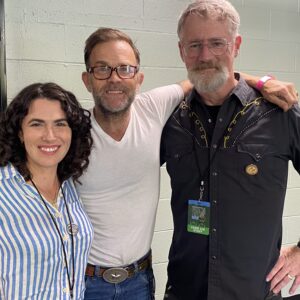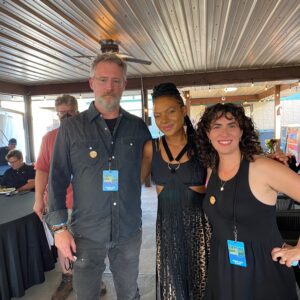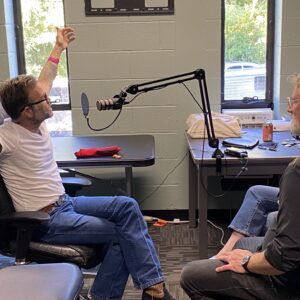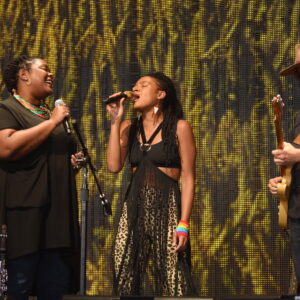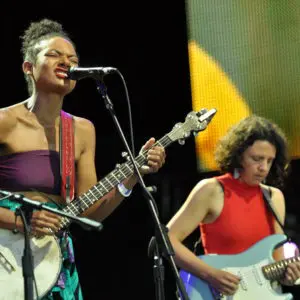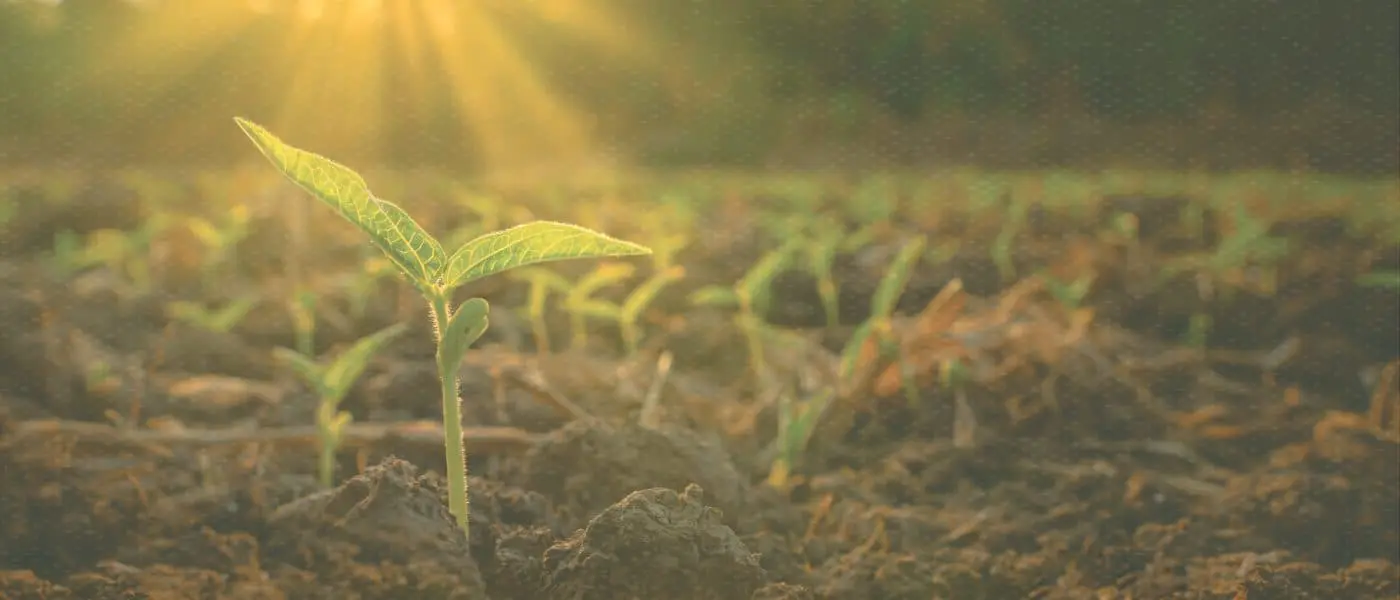In this penultimate episode of Against the Grain’s series on Artists and Activism, we get personal — as in “the personal is political.” We talk to Waylon Payne, Allison Russell and Hunter Park (who performs as She Returns from War) about how their personal lives (and, really, all of our personal lives) are political and politicized, even if we’re not the ones framing them that way. For Waylon, Allison and Hunter, “the personal is political” has led each to seek their own “chosen family” and chosen community, a place where they are loved and supported, included and treated with respect. We’re joined by Steve Duncombe, from the Center for Artistic Activism, for context on how artists telling their true experiences can be a powerful vehicle for political expression and engagement.
Listen to the episode below. And, make sure to subscribe in your podcast app of choice!
Watch artists featured in this episode in this video playlist!
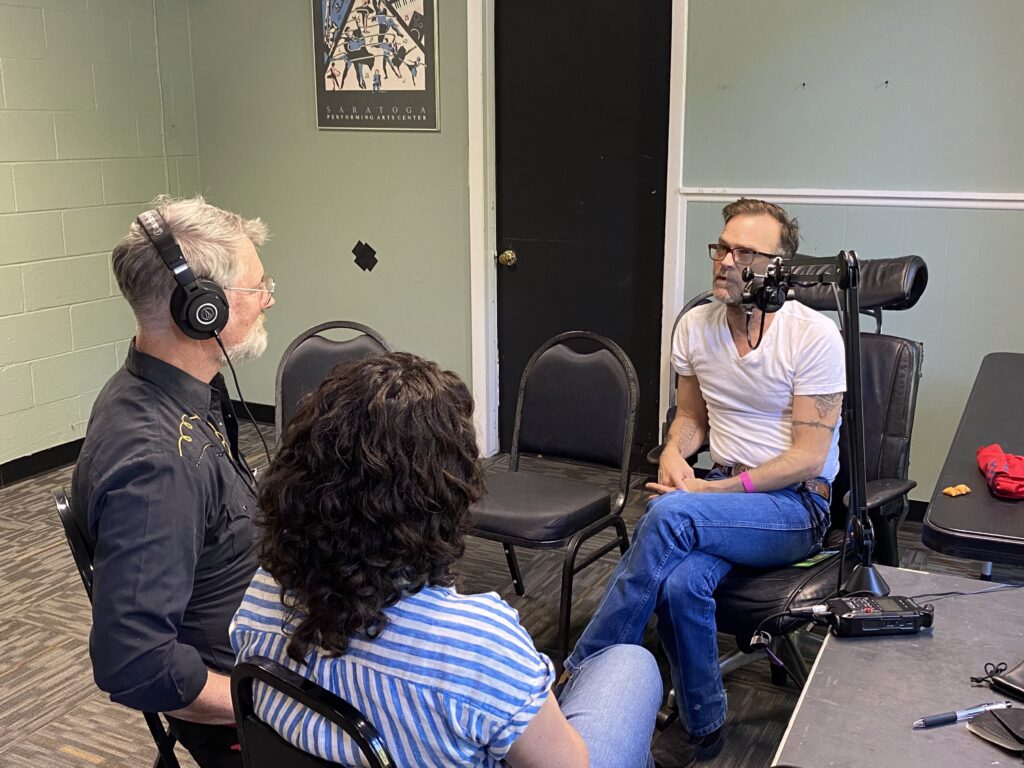
Waylon Payne with Jessica Ilyse Kurn and Michael Stewart Foley from Against the Grain.
A son of country music royalty, a teenaged Baptist preacher turned addict and actor, Waylon Payne sings about fathers and sons, faith and addiction, recovery and renewal with devastating clarity. His character-rich collection harks back to a way of telling stories in song that revealed kept secrets and promised mystery. Over his years, Payne has felt the terrible power secrets can hold and learned the transformative value of releasing them. Finally, he’s in a place where he can harness that power to create transcendent work.
Payne recorded Blue Eyes, The Harlot, The Queer, The Pusher & Me primarily at Southern Ground Nashville, a converted century-old church building just off Music Row that once housed Monument Studios. Payne’s mother, country singer Sammi Smith, cut her iconic version of Kris Kristofferson’s “Help Me Make It Through the Night” at Monument. When Payne recorded his vocals, he says, “I stood in the same spot she stood and sang while she was pregnant with me.”
To help realize his musical vision, Payne worked with producers Eric Masse (Miranda Lambert, Rayland Baxter, Robert Ellis) and Frank Liddell (Lambert, Lee Ann Womack, Chris Knight) to assemble a group of musicians that spanned both genres and generations. In addition to highly regarded players like bassist Glenn Worf; guitarists Jedd Hughes, Ethan Ballinger, and Kris Donegan; and drummer Blake Oswald, the team brought in Cage the Elephant guitarist Nick Bockrath, as well as Mickey Raphael, Willie Nelson’s longtime harmonica player and a former band mate of Payne’s father, Jody Payne. Jerry Roe, like Payne a second-generation music man whose father spent years working for Johnny Cash, played both bass and drums. Other musicians on the album include longtime guitar player and friend Dean Person, slide guitarist Harrison Whitford, and violist Kristin Wilkinson, who arranged and conducted all the strings.
As a result, Blue Eyes, The Harlot, The Queer, The Pusher & Me sounds both timeless and out of time. It exists in music’s liminal spaces, the way the late ‘60s and early ‘70s albums of Kris Kristofferson and Bobbie Gentry did in their day. “Bobbie’s my songwriting hero, the reason I do what I do — her and Kris,” Payne says. “When my family threw me out, I picked the toughest motherfucker I could think of and modeled myself after him. I learned how to be a man watching Kristofferson.”
Like those artists, Payne draws from tradition while stretching beyond any notions of the mainstream, ultimately standing apart from everything else.
Payne has come a long way from the first time he and Liddell met back in the ’90s when Liddell worked for Decca Records. Payne showed up at Liddell’s office, unannounced, declaring his intentions to become a country star. It was the same sort of bold approach Tammy Wynette had made walking in on Billy Sherrill about a block away and 30 years before, and, like Wynette, Payne hadn’t brought any songs to bolster his case. Still, Liddell found Payne’s combination of raw talent, personal magnetism, and determination compelling, even if it still needed to be focused.
Payne eventually figured out how to harness those abilities, releasing his first album and launching an acting career that included portraying Jerry Lee Lewis in the 2005 Johnny Cash biopic Walk the Line and Nashville guitar legend Hank Garland in 2008’s Crazy. At the same time his career seemed to be coming together, though, a drug problem that had started in his teens was developing to a full-blown meth addiction that was ripping Payne’s life apart. “I was acting like a spoiled rock star,” he says. “By the time I started making movies, my ego was a little out there. Then you add meth to that, and you turn psychotic without realizing it.”
Now eight years clean, Payne finally can put all the elements of his life in their proper place. Blue Eyes, The Harlot, The Queer, The Pusher & Me testifies to a decade-long journey, capturing songs and moments from his most troubled time, as well as the grace and the relationships that led him out of it.
There’s tenderness to these songs, an empathy for lost souls who may or may not find their way home. Payne wrestles with the legacy of family dysfunctions in songs like “Sins of the Father” and “What A High Horse.” A pair of poignant vignettes, “Shiver” and “Old Blue Eyes,” team with tragedy and chilling beauty. “There are jewels buried deep in the record, and if you’re a junkie, you’ll catch them,” Payne says.
He views “Dangerous Criminal” as his point of reckoning. “It’s basically me admitting I have a problem,” he says. “I am a person who will get himself into trouble and in danger unless I keep myself in check.”
“After the Storm” and “Precious Thing” play like prayers, while “Santa Anna Winds” was written as a lullaby for the young boy whose voice is the first thing heard on the album, a child Payne views as almost a son and by whose first birthday he marks his sobriety. Payne also recorded his own version of “All the Trouble,” the GRAMMY- nominated song he wrote with Lee Ann Womack and Adam Wright and which Womack recorded for her 2017 album The Lonely, The Lonesome & The Gone. Payne’s talent as a songwriter has also been recognized by artists Ashely Monroe, Miranda Lambert and Wade Bowen, who have chosen to record his songs.
Payne may have recorded Blue Eyes, The Harlot, The Queer, The Pusher & Me in Nashville, but it started a decade ago in Texas, as he came through the worst of his addiction and got clean with the help of family and friends there. “For a while, I couldn’t even write,” he says. “I couldn’t put thoughts together, because I had really fried my brain. Once I got sober, everything came.”
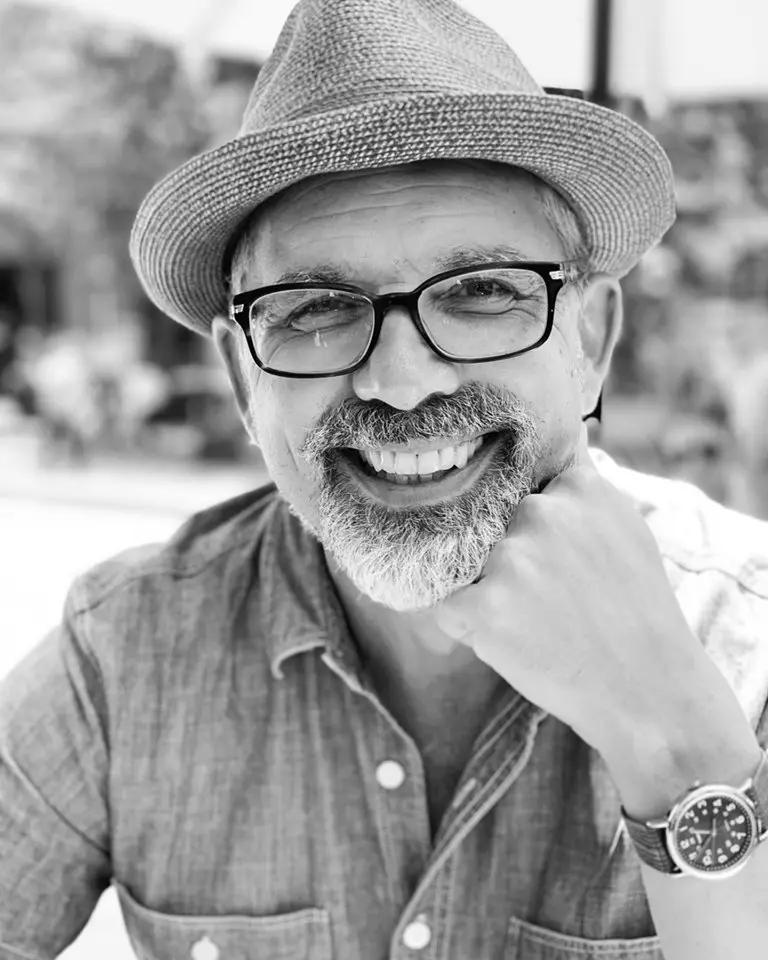
Stephen Duncombe has more than three decades of experience as an educator and activist. With a PhD in Sociology, he has taught in the City and State Universities of New York. Currently he is a Professor of Media and Culture at New York University. Duncombe received: Chancellor’s Award for Teaching at SUNY; Dean’s Award for Excellence in Teaching at NYU; The University Distinguished Teaching Award at NYU.
An activist his entire adult life, he co-founded a multi-issue community activist group in the mid 1990s, the Lower East Side Collective. During this period the group won an award for “Creative Activism” from the Abbie Hoffman foundation. He was also a lead organizer in the international direct action group Reclaim the Streets.
Stephen Duncombe is the author and editor of eight books, including Dream: Re-Imagining Progressive Politics in an Age of Fantasy and the Cultural Resistance Reader. He writes on culture and politics for a wide range of scholarly and popular publications. Duncombe created an open-access, open-source, web-based edition of Thomas More’s Utopia. His scholarly and activist work has been supported by, among others: the Open Society and Fulbright foundations; the National Endowment for the Humanities; and National Endowment for the Arts.
In 2024 Duncombe published Æffect, a book on assessing the impact of artistic activism. Steve Duncombe co-founded the Center for Artistic Activism with Steve Lambert in 2009.
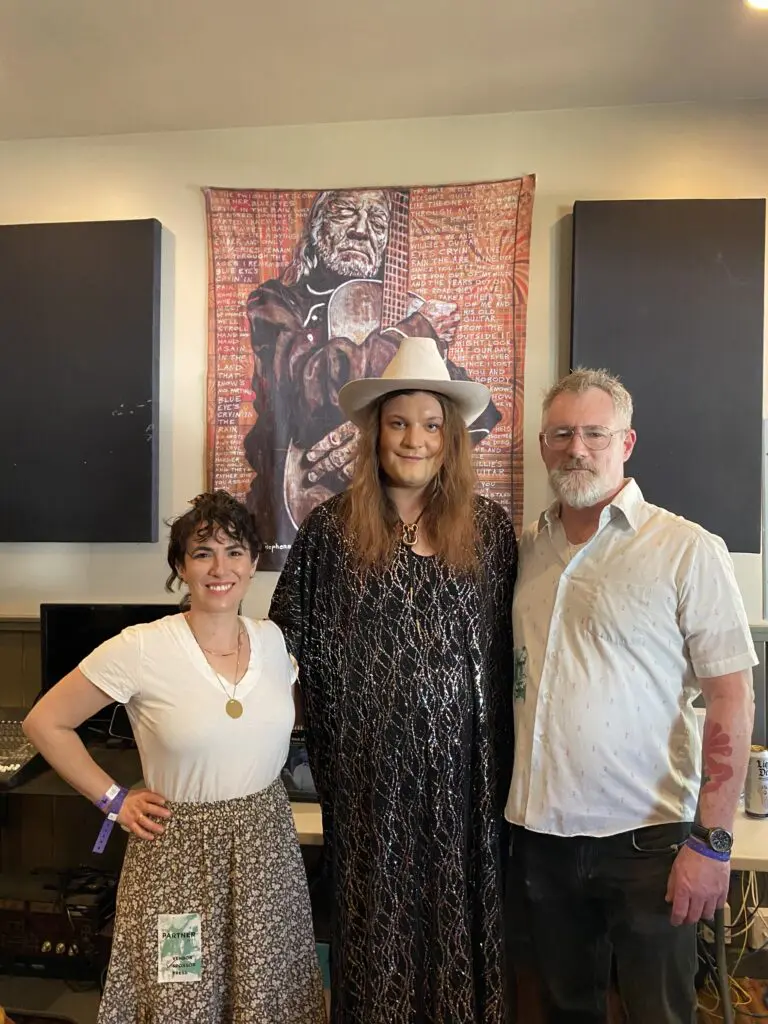
Hailing from the historically rich city of Charleston, South Carolina, Americana music artist Hunter Park is defining what it means to not only live in the modern south, but to be a trans woman and artist within this landscape. Combining folk-infused vocal melodies and evocative lyrics that capture the unfiltered human experience, She Returns From War is taking her seat in the Americana music world with grace, strength and passion.
And her journey has been a wild one. Since founding the project in 2014, She Returns From War has released many singles, including her second full-length album, Mirrored Moon Dance Hall, in 2018. The 11-track release dives into the themes of love, loss and self-exploration. Now, with a whole new collection of stories to share, she returns with her latest full-length record, co-produced by Joel Hamilton (Mechanical River) and Wolfgang Zimmerman (Band of Horses, SUSTO, Brave Baby). The album is a slow-burn, deceptively hitting the listener with vocal lines that are just as elegant as they are intensely emotional. Look beyond the surface and you just might see that the album is meant for healing the heart.
Now, in 2023, the project shows no signs of slowing down. From opening for Bernie Sanders at his presidential rally in Charleston to performing at national festivals like Stagecoach and High Water Festival and with artists such as Pat Benatar, Band of Horses and Nikki Lane, She Returns From War is sharing with the world what the modern south should look and feel like: inclusive, compassionate, unfiltered and loving.
Fresh on the heels of Ruthless, her 2023 album, Hunter has just recorded her fourth album, Dinner Music, which will be out in early 2026.
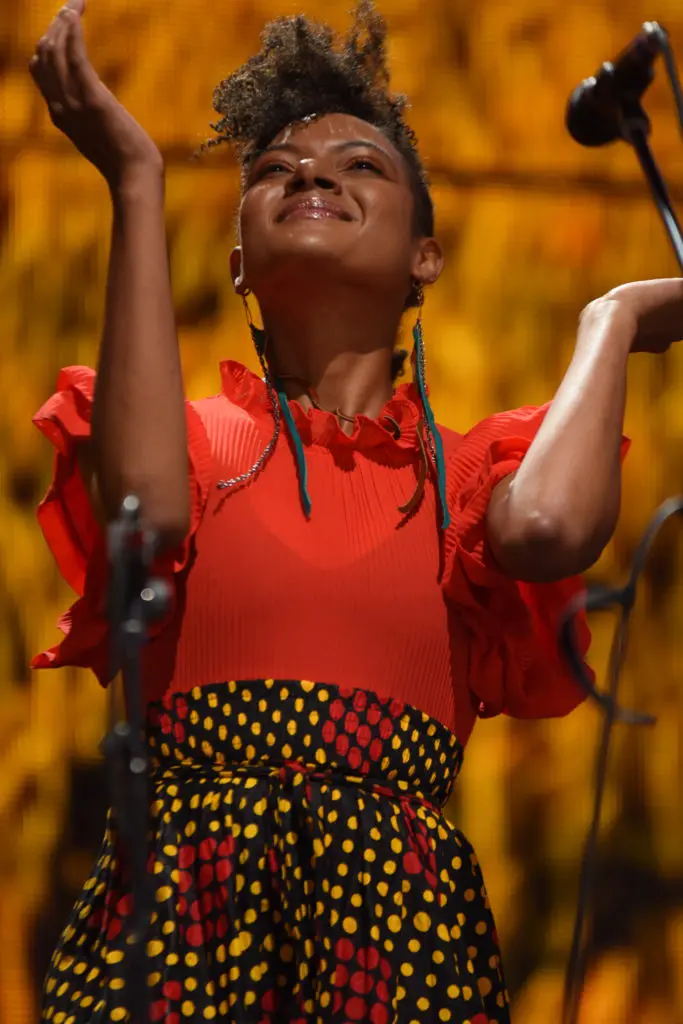
Allison Russell at Farm Aid 2022. Photo © Brian Bruner / Bruner Photo
Montreal born and Nashville based, Allison Russell is a Grammy, Juno, Americana and Folk Awards winning artist, actor, author, songwriter, producer, human rights advocate, survivor and mother. She is the co-founder of Once and Future Sounds and Love Rising. Her debut solo album “Outside Child” was released in 2021, followed by “The Returner” in 2023 via Concord/Fantasy Records.
Prior to her solo career she co-founded, recorded and toured internationally with the bands Po’Girl, Birds of Chicago, and Our Native Daughters. She is a member of Joni Mitchell’s Joni Jam band.
Russell’s ensemble the Rainbow Coalition opened for Hozier’s Unreal Unearth tour throughout 2024. Their All Returners headlining tour will continue Spring of 2025 in Australia and North America. Allison made her Broadway debut starring as Persephone in Anais Mitchell’s Hadestown from Nov 2024 to Feb 2025. Russell’s memoir will be published by Little Brown, release date TBA.
Episode 6: When the Personal is Political
KURN: Welcome back to Against the Grain, the Farm Aid podcast. I’m Jessica Ilyse Kurn. In this episode of our Artists & Activism series, things get personal.
FOLEY: And, I’m Michael Stewart Foley. Today we’re gonna talk to some artists we’ve met at Farm Aid and at Luck Reunion about how when the personal is political, choosing your family and finding your community can be acts of resistance.
KURN: You know, if I had to guess, I’d say most people are not aware of the origins of the expression “personal is political” or even personal politics. We hear it all the time because it’s been absorbed into our culture in the same way that all politics is local, is often stated but not always understood. So Michael, can I put you on the spot and can you put on your historian hat and explain this term?
FOLEY: OK, I guess so. Um, a quick historical primer. The notion that the personal is political entered the American political imagination thanks to second wave feminism. Before the late 60s and early 70s, politics was thought of primarily as a public issue coming from the major political parties and the three branches of government. Then the social movements of the 50s and 60s, particularly the Civil Rights Movement, showed Americans that when the government failed you, it was OK to bring politics into the streets. When the Women’s Liberation Movement emerged from the other movements of the sixties, women brought politics from the streets into their homes and workplaces.
FOLEY: They focused on the cultural assumptions of sexism that they experienced in everyday life. These are things like the gendered expectations of tending home and hearth, even if they had a full time job outside the home. They gathered in consciousness raising groups to talk about all the ways that they were discriminated against by the men in their lives: their husbands, their boyfriends, their fathers, their brothers, their bosses. This is where the idea, the personal is political came from.
KURN: At Farm Aid, we are deeply committed to following our president Willie Nelson’s big tent approach: Everyone is welcome. Lifting up farmers regardless of race, gender or sexual orientation has always been, and always will be central to our mission. We strive to put on an annual festival that reflects the full diversity of the folks who work the land, who produce our food and who bring it to us at our markets and tables. And when we come back, we’ll hear from Steve Duncombe of the Center for Artistic Activism on the role artists can play when the personal is political.
FOLEY: Farm Aid 40 is heading to Minneapolis, Minnesota on September 20th. Whether you can join us in person at the festival or will be with us in spirit, we’re so grateful for your support of Family Farmers. When we lift up Family Farmers, we all win. A gift of Farm Aid enables us to make sure family farmers stay on the land where they belong and allows us to connect them to resources they need to face the challenges they’re up against at the FarmAid.org/podcast today.
KURN: Welcome back. If you’ve been listening to this series, you’ll recall that we spoke to Steve Duncombe, co-founder of the Center for Artistic Activism. Steve talks about how artists are uniquely qualified to tell stories. Storytelling is visceral and emotional, and crucially, storytelling makes people want to take action.
FOLEY: Of course, it’s not a one size fits all approach, but when we see so much division, so much hate, so much cruelty, what can artists do?
DUNCOMBE: I think one of the things that arts and culture can do really well is conjure up an alternative of a world that you want to live in, a better world that you want to live in.
FOLEY: So, what would that look like?
DUNCOMBE: I don’t think it necessarily has to be a grand world, but just a kind of world where people take care of each other. And the stories and songs which is about, you don’t have to fuck people over to survive, and that you can actually take care of people, not just your father and your mother. I mean, that’s great, but about everyday people and having that sort of kindness of everyday people. Um, and I think there’s a lot of potential for that, and I think that stuff gets under people’s skin. Is that of coarseness, which I think matters the most, like, yeah, we just don’t do that. We don’t call people those names.
DUNCOMBE: Yeah, we don’t denigrate people because their sexuality. That’s just not cool, man. You know, and I think that music because it’s popular, because it’s down to the ground, um, works best when it works at that sort of level, is changing the coordinates of not only what is possible, but what is desirable.
KURN: This is the kind of thing that any artist can do, sort of like we discussed with Emily Nenni and Dylan LeBlanc in episode four of this series about creating a safe space for everyone at their shows and in their music.
DUNCOMBE: I’m still for big P politics and for, you know, a superstar Bono, Bruce Springsteen. You know, coming up and saying, you know, calling them fascist to fascist, you know, that I still think that there’s some value to that. But I think, you know, you have to be a superstar in order to do that, one, because um in order to have any meaning, you have to have a big following, and two, you have to be able to suffer the economic fallout that might happen around those sort of things.
FOLEY: Right, not everyone is insulated from the backlash that taking a stand might bring. Not everyone is Springsteen or Taylor Swift. So what can up and coming artists do?
DUNCOMBE: For younger artists, I really think, you know, speaking the truth of their experience, but the whole truth of their experience. And the whole truth of their experience is not just, you know, I fell in love, or my billfold’s bigger than your billfold, but their experience of, you know, what it’s like to grow up young and have your future ripped out from under you. Um, which is exactly where young people are at this point, um, or what it’s like to grow up and have people hate you for your sexuality or the color of your skin, or any untold number of things that people hate people now for, and not to be preachy about it, but just, you know, tell the story and then very importantly, tell the story of what a different world might look like. Maybe not the same song, right? Uh, but I think that there’s something, you know, that can work.
KURN: I feel like this is where this series has been leading us to artists telling their stories, speaking the truth of their experiences, from the good to the bad and everything in between.
DUNCOMBE: And I’m just thinking of Chappell Roan is not a political artist, but she just created a whole world of girls loving other girls, and that normalizing and really silly catchy songs about being hot, you know, but it’s hot within a lesbian context. I mean, that’s that’s pretty amazing, right? Would she show up at a Farm Aid and call herself political? Maybe not, um, but maybe, but I do think it is important for people to come out as political at the same time and say, no, I actually am political.
FOLEY: Exactly, to show up, to tell stories, to imagine a better world, these are the actions of a political artist. When we come back, we’ll hear from artists who have personal stories to tell.
KURN: If you’re a farmer, Farm Aid is here for you. Whether you have been farming for a few years or many decades, we welcome your call. Our team will listen and point you in the right direction. You can call the Farmer hotline at 1-800-FARMAid. That’s 1-800-327-6243 or reach out online www.farmaid.org/podcast.
PAYNE: Hi, my name is Waylon Payne, and I’m a country music singing sensation. We are at Farm Aid and, uh, somewhere in, uh, Saratoga Springs.
KURN: You may remember Waylon Payne from episode three of this series, the one on artists and farm politics. He plays in Farm Aid President Willie Nelson’s band, and it is a solo artist too. You can catch him on the road most of the year, actually. Waylon’s commitment to Farm Aid is directly tied to his own family’s connection to the land. He got personal when we asked him if he considers himself a political artist.
PAYNE: I guess there’s this could get heavy, uh, not it’s OK, but there are several aspects of my life that require me to be, uh, vocal. One, I’m a gay man, uh, and, uh, I’m 52 years old, so when I was coming up there, you know, there was, we’ve seen a lot, uh, and, uh, you learn early on that, uh. Some people are OK with that choice, or at least back then, and some people aren’t. And so you had to learn pretty quickly your worth and your value and how to defend that. You know, a lot of young people, I know this may sound crazy, but a lot of young people never got their licks, and you can tell. Because life is not supposed to be easy.
PAYNE: It’s a hard life and there are reasons that we learn lessons, you know, so we can grow. I’m from a generation where we had to learn how to stand up, you know, I, I lost my whole family basically because of being gay and, uh, except for Willie and my except for my dad, you know, uh, but the mom side of the family for a while didn’t want anything to do with me and, uh, and, uh, so, you know, I kind of made a decision a long time ago that if you’re not gonna respect who and what I am, then you don’t really have a place in my life and so there’s never really been a question of. You know, I’ve never, you know, that’s kind of happened a long time ago and the people in my life are the people in my life. I don’t have bad people in my life because I don’t think you have to.
FOLEY: I appreciate the way he frames that. On the one hand, Waylon had to deal with being kicked out of his family, just because he’s gay. So, on the other hand, choosing not to have people who don’t respect him in his life at all.
KURN: This sounds a lot like what Allison Russell calls having a chosen family of people who do support, love and respect you.
FOLEY: Allison was really generous in spending a lot of time with us when we spoke to her, so we covered a lot of ground. Listen to her echo some of the things that Steve Duncombe and Waylon touched on when it comes to personal politics.
RUSSELL: I think it’s before I thought of myself as an artist, I was a queer, Black kid growing up in a white supremacist abusive family. So my existence was the fact that I exist was political in my family, who I am was political, and I did not have the luxury of seeing myself as outside of politics or outside of a perception. That I had to conform to something that I didn’t fit into, you know, and so it’s it’s both existential and also survival for me to start finding circles of people who saw me as an equal, to start finding circles of people who weren’t abusive, seeking out a circle, seeking out a community, seeking out frank. places to be safe, you know, I was unsafe for most of my childhood and I had no choice about who I was born to fostered by, adopted by, abused by in those years and those for none of us do. We don’t get to choose any of that.
KURN: I don’t know if we could find a better example of the personal being political. Allison lived every day with experiences of being diminished and abused and finally being confronted with a choice to stay or go find another kind of family.
RUSSELL: You know, I was 15 and I knew that I was safer sleeping in a graveyard on a park bench than I was in the home of the people who called themselves my family at that time, you know, and then eventually we need community, we need, we need, we don’t thrive in isolation. So eventually I had to start seeking out a community outside of my family because I didn’t have a family that I could just blend into and be supported by, you know, and that’s the case for a lot in our queer culture. We talk about chosen family a lot. This is something that’s understood because so many of us were rejected by the families that we were that we started out with, then you have to create your own. And we all do, all humans, we all do this throughout our lives as we get involved in it, maybe we’re called to a certain line of work in my case, obviously music and art for me were lifelines. That was it wasn’t just entertainment, it wasn’t, it was survival.
It was being shown a world of someone else’s imagination. that I could inhabit, it was hearing Tracy Chapman’s “Behind the Wall.” You know, it was hearing Sinead O’Connor sing “Mandinka.” It was watching her sing about childhood sexual abuse on Saturday Night Live and tear up a picture of the Pope to protest the abuses that were being covered up by the Catholic Church. Like those things were were were survival and road maps to survival for me, it wasn’t. Like some sort of political, I’m going to take a stand commentary. Those were like rearrange my molecules. This person exists and they are being as brave as they are and speaking this truth and I’m not the only one.
So that means there’s other people like me out there somewhere, you know and and that and then slowly finding my chosen family through art. Um, that was how I learned how to survive.
FOLEY: Super powerful. Check this out: Here’s Allison performing 4th day prayer at Farm Aid 2022. It’s a song about overcoming her childhood trauma, but she expands its meaning to apply to farmers and the Farm Aid community overcoming its collective scars.
KURN: Hunter Park has a really great perspective on normalizing an alternative inclusive version of America.
PARK: My name is Hunter Park, and I go by She Returns from War, and I am excited to be here with y’all.
FOLEY: If you don’t know Hunter Park, go check out Ruthless, her latest album performing as She Returns from War. Hunter told us she chose the name She Returns from War because it represents a woman who’s overcome and returned from struggle and is now moving forward.
KURN: Like Allison and Waylon, she told us that her path to activism grew out of her personal experience as a trans woman.
PARK: I grew up in South Carolina in Charleston, South Carolina, and I was surrounded by amazing people who just didn’t quite have the understanding of things yet. And uh there’s a lot of painful, painful history that we have, you know, had to learn accountability for and move moving forward from that. I saw myself as a transgender woman, and I saw how you can meet people and even a playing field simply by having a conversation and being uh the genuine person that you are and you know, kind of telling people that, like telling people your humanity at first because I’ve come across a lot of conservative people who don’t quite understand where I fit into this and what, uh, you know, they’re There are rule breakers like Willie, who do it in a way that brings out the humanity in every situation, and that is what benefits people because at the end of the day, we’re just like soft, soft bodies moving through this like crazy. turmoil world and Uh, something I’ve really, really, really learned recently is forgiveness and kindness and all of those things work so much more in community and community building, and if you have the right reasons, and it takes work. It’s not like I wake up every day and act like the activist I should be, the friend I should be. I’m not claiming any of those things, um. I, I know though that it’s a lifelong learning process, and when you can find community to put that energy into, uh, to give back, it’s easy to stand up for the right reasons, it’s easy to see people for who they really are.
FOLEY: Another case for building community.
KURN: Definitely. Although I keep thinking about how it seems like the burden of transcending hate and polarization falls on the people who are being targeted.
PARK: There’s always respect. And you know what I think is so funny about that is I’m not going to stop doing what I’m comfortable with doing, and I know that they’re not going to stop doing what they’re comfortable with doing, but they can learn to make themselves uncomfortable for a split second to see that it’s not not all about them. And, uh, I learned a lot of that from, uh, from amazing, you know, makers and doers and, and everything within my community and, you know, to practice intellectual humility is, is insanely beneficial to a person’s mind, body and spirit. And I think that there’s lessons that we can learn from extremely talented artists who have always done those things, like, you know, Patty Griffin and And Emmylou Harris and Willie and all of these people who, who take the role of lifelong learners so that they can kind of preach a little bit of enlightenment towards everybody else.
FOLEY: It’s a really good point about trying to take the long view, the life-long view, and put things in perspective. And I like Hunter’s message about practicing some intellectual humility. That seems rare in our present knee-jerk political culture where everyone has a device in their pocket that makes it possible to fire off the first thought that comes to mind.
KURN: Yeah, it doesn’t exactly lend itself to pausing for some self-reflection, which is maybe why some artists hesitate to be outspoken and struggle to speak their truth publicly.
PARK: Fear of being misunderstood is something that will take away from you every day if you’re not living your full authenticity. And I mean, that is another thing that you have to work on every day. And it’s not like I was saying that. He’s comfortable, um. I’m not, I, I don’t know it. I’m learning it.
And I think that if you can use that viewpoint when you talk to other people, just know that no one understands really anything about how the world turns. It just does it and Uh, you know, people come in and, and out and back and around and, and all you can try to find is this kind of peace, you know, Willie said that before he’s about how not, we’re not worrying and then, you know, they’ve sung those songs about why worry. So it’s an effort that is made every day to try to like get to that point. I’m not saying that I’m in any way like a pro at it. Like I make mistakes every damn day. And I don’t do the, the things that I need to to like focus on enlightenment and maybe have one too many margaritas, but to really sit with yourself and ask the question of why you want to level the playing field and why you want to talk to people, because a lot of people just don’t know why they’re doing things yet. And when you can figure that out through art or music or farming.
You know, I, that’s a, that’s another way of building community and seeing that everyone’s a neighbor and um When we can use that neighborly thing to help people, um, it, it is a practice of humility. If you’re up on a mountain by yourself and you don’t care about what, what’s going on below, like, you know, they’re not gonna come up to you when the lights go out.
KURN: Let’s steer our conversation back to Allison Russell, who spoke so eloquently earlier about chosen families and chosen communities.
FOLEY: Allison told us about the challenges of building an inclusive community in the face of a music industry that maintains a narrow and exclusive vision of the artist it wants to promote, particularly the country music establishment.
RUSSELL: I’m incredibly proud of our Americana music community, and I will say that in my definition of Americana, it goes far beyond genre because to me, Americana denotes the musics that have grown out of this amazing experiment. That is this continent. And so when I’m talking about America, I don’t just mean the United States, I mean from Haiti to Nunavut, from the Caribbean to the Arctic Circle, including Canada, including Mexico, including all of South and Central America. That’s what I mean when I’m talking about America and Americana is the music. Uh, and culture that has grown out of that. And so it’s very, very vast.
So to me, Americana encompasses every other genre in that sense. What I love about the Americana community, um, as a trade organization, as a as a nonprofit philanthropic foundation now as well, as a group of radio stations, is the expansiveness and inclusivity of their programming. And I think of Willie Nelson. Of of Dave Matthews, of John Mellencamp, of Neil Young, of Margo Price, of, you know, the amazing artists who formed the board of directors um of of Farm Aid as being very much voices of that community, of that very, very expansive Americana community, whether you want to call it outlaw country, whether you want to call it, you know, that that’s sort of semantics.
KURN: Whatever the term, the key is the expansiveness, the inclusiveness of Americana music, and by extension of the Americana community.
FOLEY: This is America, where our musical history and culture is so diverse and breathtaking. I mean, the government can try to shut down DEI programs, but you can’t shut down diversity in a culture. As Beyonce sings on her latest album, history can’t be erased, and that includes the history of American music. Although some powerful people in the industry sure do try. Take country music, for example. Here’s Allison again.
RUSSELL: Mainstream country as a musical, political industry power, I don’t identify with particularly. I don’t choose to because so much of that world is still very, very, very much bound up in a whitewashing and an appropriation. Um, and an exclusion of any queer voices, any voices of color, immigrant voices, political dissenting voices, um, and it has been so rigidly that way for so long that I don’t choose to spend my energy trying to change that world. That’s not where I need to Spend my energy because I’m much more interested in amplifying Margo Price. I’m much more interested in amplifying Brittney Spencer, Amethyst Kia, Rhiannon Giddens, um, Mickey Guyton, Sunny War, you know, uh, Willie, all of the amazing artists who are doing really, really important art.
KURN: Allison sounds like Willie himself when he left Nashville behind for Austin in the early 1970s. There’s something liberating about not caring what the industry thinks.
RUSSELL: Can we just acknowledge how political country is? It is intensely political, that kind of exclusionary identity and, and what to name. Oneself, the music of a country, that in and of itself is a political statement. You’re not just talking about the countryside. It’s a, this is America. We are America.
Our voices represent America. And in that version, America is white, it is mostly male, it is Christian. It is intolerant of anyone outside of that very narrow idea of who represents a country. And I am basing this on the mainstream country chart right now. You can go look and see who’s getting played, you know, just being, just being a woman, you know, you, you don’t get airplay. They won’t play two women back to back. They talk about it openly. So that’s political.
KURN: Like in the music industry, we see anti-inclusion efforts throughout American society, including in our farm and food systems.
RUSSELL: What in fact is uniting us is is this horrific uh income gap where 1% of the population is hoarding not just 1% of the income, but the resources as well and doing irreparable damage to our climate. And um in the process, affecting all of our food systems and sources as well.
FOLEY: That seems like a good place to end this episode, a reminder that artists and all of us doing the work, speaking their true experiences and telling our stories, brings us together and moves us forward.
KURN: Our next episode is the series finale. We’ll bring you back to Luck Reunion to hear a live panel discussion we recorded there.
TOURVILLE: Using the platform and being like unafraid. Of whatever industry, pressure or anything to just speak for what’s right, you know, and show up in all ways with being creative and politically. Present, you know, and environmentally present, just show up as like a person, you know, no matter what.
FOLEY: That was JJ Tourville of the band The Deslondes, who was one of the four artists on the panel, including Farm Aid board artist Margo Price, who told us about the climate disasters they endured and who have words of advice where sustaining community is concerned. Don’t miss it.
KURN: Is there something you want us to cover in the future? Send us an email or drop a comment. You can email us at podcast@farmaid.org and find us on social media, which is at Farm Aid on Instagram, Facebook, Threads, and now on BlueSky.
FOLEY: And don’t forget YouTube, where you can watch almost 40 years of performances and other content. Let your friends know about Against the Grain. We’re beyond grateful when you listen, share, like and subscribe to this podcast.
KURN: Against the Grain was written and produced by us with sound editing by Endhouse Media and direction from Dawn Sorokin. And thanks to Micah Nelson for our awesome theme music.
FOLEY: Thanks so much to all the artists who took the time to speak with us. Head over to our website to watch videos, check out those playlists, and learn more. www.farmAid.org/podcast. And thanks to all the farmers out there. We’ll chat with you next time.
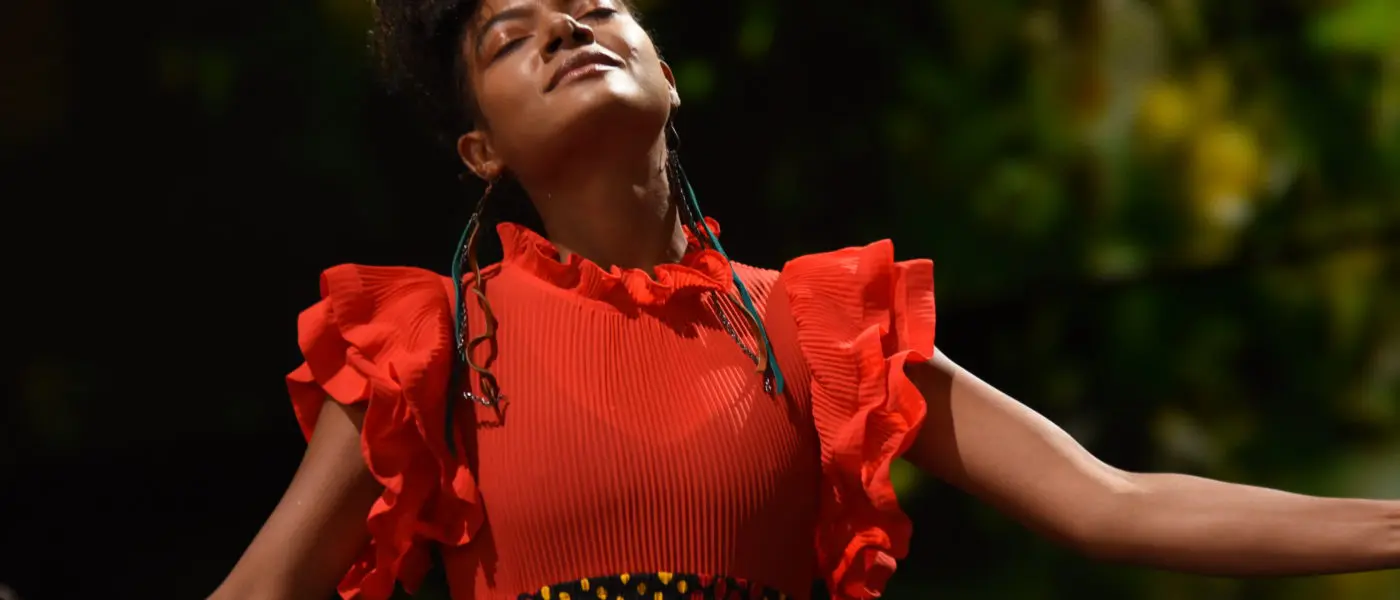
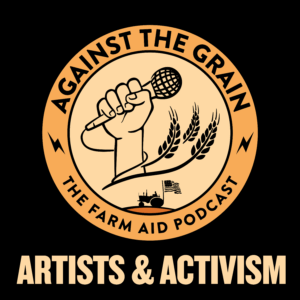 Listen to the Artists and Activism series of Against the Grain: The Farm Aid Podcast to hear from more than two dozen artists who use their art and voices as vehicles for political engagement and expression on issues that matter to them.
Listen to the Artists and Activism series of Against the Grain: The Farm Aid Podcast to hear from more than two dozen artists who use their art and voices as vehicles for political engagement and expression on issues that matter to them.

